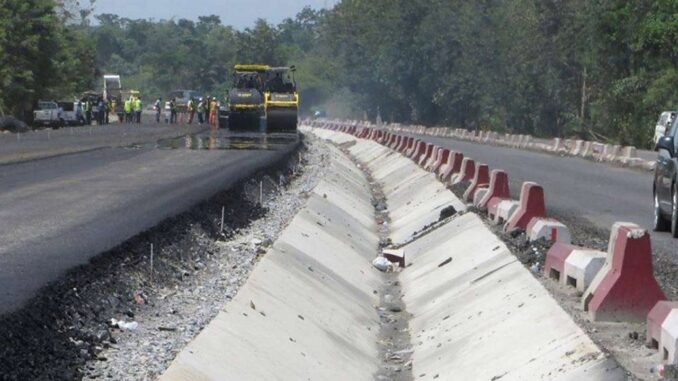
With the onset of rainy season, coupled with the snail-speed with which the Lagos-Ibadan expressway reconstruction is being executed, there is serious doubt that the critical road would be completed as scheduled this year. For a road so crucial to inter-state vehicular movement and commerce, that will be a great disservice to Nigerians, besides showcasing government once more as lacking commitment to execute a public-oriented road project. The Muhammadu Buhari administration has certainly tried to bequeath itself a good legacy in relation to this expressway, and particularly when compared with the performance of previous administrations; but the fact remains that after about 13 years of reconstruction, the road is yet to be completed; and the Nigerian commuters are at the receiving end having to cope with traumatic traffic snarl, often compounded by accidents and traffic robbery. Nigerians do deserve much better than this; and it is important for government, particularly the Minister of Works and Housing, Babatunde Raji Fashola to up the ante of reconstruction work on the road. Fashola, and the Managing Director/CEO of the Nigeria Sovereign Investment Authority (NSIA), Uche Orji, had assured that the expressway will be completed before the end of 2022.
But with the works virtually stalled, there is little in the horizon to show that the federal highway, which passes as the busiest road in the country will be delivered as promised. Nigerians will hold government by its words. The completion date should remain sacrosanct. From reports, factors responsible for the slow pace of work on the highway include paucity of funds, lack of seriousness on the part of government, lack of supervision, lackadaisical attitude of the contractors, litigations and demand for compensations, all of which are hampering progress on the project, which has been on for 13 years, precisely since 2009.
As it were, works on the proposed toll plazas at Kara, Ogere and Ibadan are yet to commence thereby amplifying doubts about the possibility of completing the project this year. Many critical pedestrian and overhead bridges are still on the drawing board, while the reported scrapping of laid asphalt by the contractor on a section of the road is a pointer that all is not well with the project.
The Director of Highways, Federal Ministry of Works and Housing, South-West Zone, Adedamola Kuti, reportedly explained that there was no cause for alarm as the road will be delivered on schedule, noting that the scrapping of asphalt is normal as the contractor has a duty to correct any noticeable anomalies on the road. Could this be an indictment on those who are supposed to supervise the work? Is it likely to further stretch completion time or resources and energy put into the project?
The unending reconstruction work and indiscriminate placing of road dividers, which narrow the road at several sections not only cause avoidable accidents but also create severe traffic snarl. Motorists are complaining about numerous slabs blocking the road. A journey that would normally take less than 30 minutes from Lagos to the Redemption Camp, for instance, sometimes takes upwards of five hours. Motorists are thus exposed to all kinds of risks. Highway robbers capitalise on the traffic situation to rob innocent travelers of their valuables in traffic. That is the unfortunate plight of motorists plying the ever busy highway. In a way, the expressway is fast assuming the reputation of a death trap; what with frequent road mishaps causing loss of lives and properties. Sometimes, a whole stretch of the road would be locked down as a result of petrol tanker accident that spills its dangerous content on the road. For instance, on Tuesday April 2 this year, a tanker oil spillage at Ibafo end of the road reportedly locked down the road for close to 48 hours. Many motorists and users of the road slept on the road as it was a horrendous experience that saw vehicles at standstill for several hours! The suffering and pain for motorists and residents on that highway have been there for a long time but have lately been magnified more than ever before.
The history of this all important highway sadly shows that it is replete with shame, negligence, and less than due diligence. Built about forty years ago, the Lagos-Ibadan Expressway has suffered much neglect and bastardisation; a case study of how not to manage an important national infrastructure. The road was initially awarded to Dr. Wale Babalakin’s Bi-Courtney Company by the Jonathan administration; but the company’s performance was bugged by multiple court cases instituted by stakeholders, including some governors on the axis. After several wasted years, the Buhari administration re-awarded the contract to Julius Berger and RCC.
A time frame of three years was initially given for the completion of the road in 2016 when the contract was re-awarded. But seven years later, it is doubtful if the road has reached 60 per cent completion. The new projected completion date of December 2022 looks uncertain.
Funding being a major constraint, the federal government will do well to address the issue. The use of ad-hoc strategies such as Sukuk to raise funds appears to be inadequate. Unfortunately, government over the years has abused or mishandled various roads funding programmes, including tolling and fuel tax. Government should go back to the drawing board to address this problem. Above all, the Minister of Works should ensure the completion of Lagos-Ibadan Expressway in the promised time.
END

Be the first to comment